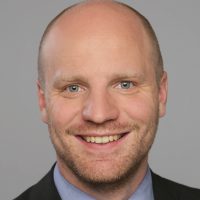AGI News
Niklas Helwig, DAAD/AGI Research Fellow

Niklas Helwig
Niklas Helwig was a DAAD/AICGS Research Fellow in October and November 2018. Prior to his research stay at the AICGS, he was a Transatlantic Post-Doc Fellow for International Relations and Security (TAPIR fellow). He was based at the RAND Corporation and the Center for Transatlantic Relations in DC, as well as at the German Institute for International and Security Affairs (SWP) in Berlin. Between 2014 and 2016. he worked as Senior Research Fellow at the Finnish Institute of International Affairs in Helsinki. Dr. Helwig was also a Visiting Researcher at the Centre for European Policy Studies in Brussels. He researched and taught at the University of Cologne and the University of Edinburgh, from where he received a double PhD (‘co-tutelle’). Dr. Helwig was a Marie Curie Early Stage Researcher in the Initial Training Network on EU external action (EXACT).
Dr. Helwig’s research interests include Germany’s foreign and security policy, European defense cooperation, transatlantic security cooperation, as well as the EU as a Global Actor. He wrote extensively for think tanks, online blogs, and academic journals, including European Foreign Affairs Review, The International Spectator, Internationale Politik und Gesellschaft, Huffington Post, EurActiv, and War on the Rocks.
During his time at the AICGS, Dr. Helwig analyzes U.S. domestic perception of the transatlantic alliance during the 2018 midterm elections. Lately, the U.S. administration emphasized a transactional perspective on the relationship with its allies. Historically, however, it can be argued that the transatlantic alliance was about more than economic prosperity and mutual defense, and instead based on a broader societal belief in shared values and identity. By analyzing the debates around midterm races across the U.S., the project aims to shed light on the question whether this notion still holds true in today’s America.
Additionally, he was a 2017-2018 participant in AICGS’ project “A German-American Dialogue of the Next Generation: Global Responsibility, Joint Engagement,” sponsored by the Transatlantik-Programm der Bundesrepublik Deutschland aus Mitteln des European Recovery Program (ERP) des Bundesministeriums für Wirtschaft und Energie (BMWi).
AGI is pleased to welcome Niklas Helwig as a DAAD/AGI Research Fellow in October and November 2018. Prior to his research stay at the AGI, he was a Transatlantic Post-Doc Fellow for International Relations and Security (TAPIR fellow). He was based at the RAND Corporation and the Center for Transatlantic Relations in DC, as well as at the German Institute for International and Security Affairs (SWP) in Berlin. Between 2014 and 2016. he worked as Senior Research Fellow at the Finnish Institute of International Affairs in Helsinki. Dr. Helwig was also a Visiting Researcher at the Centre for European Policy Studies in Brussels. He researched and taught at the University of Cologne and the University of Edinburgh, from where he received a double PhD (‘co-tutelle’). Dr. Helwig was a Marie Curie Early Stage Researcher in the Initial Training Network on EU external action (EXACT).
Dr. Helwig’s research interests include Germany’s foreign and security policy, European defense cooperation, transatlantic security cooperation, as well as the EU as a Global Actor. He wrote extensively for think tanks, online blogs, and academic journals, including European Foreign Affairs Review, The International Spectator, Internationale Politik und Gesellschaft, Huffington Post, EurActiv, and War on the Rocks.
During his time at the AGI, Dr. Helwig analyzes U.S. domestic perception of the transatlantic alliance during the 2018 midterm elections. Lately, the U.S. administration emphasized a transactional perspective on the relationship with its allies. Historically, however, it can be argued that the transatlantic alliance was about more than economic prosperity and mutual defense, and instead based on a broader societal belief in shared values and identity. By analyzing the debates around midterm races across the U.S., the project aims to shed light on the question whether this notion still holds true in today’s America.
Supported by the DAAD with funds from the Federal Foreign Office (FF).









